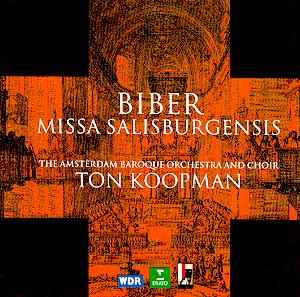
The Missa Salisburgensis has long evoked awe and wonder at its scale and
magnificence, being scored for no less than 53 vocal and orchestral parts
and (with the inclusion of the motet "Plaudite Tympani") lasting nearly three
quarters of an hour - even at modern tempi. It is almost certainly the largest
scale Mass setting of the early Baroque. For many years its provenance was
uncertain; it had been attributed to the Italian composer Orazio Benevoli
as a commision for the consecration of Salzburg Cathedral in 1628. It is
now known to be by Heinrich Ignaz Franz Biber and was first performed in
Salzburg Cathedral in October 1682 in celebration of the eleventh centenary
of the foundation of the Archbishopric of Salzburg by Saint Rupert.
Biber was born in Wartenburg, Bohemia, in 1644 and became a most widely acclaimed
composer in Bavaria, Austria, Bohemia and Moravia, especially in the well
nigh incredible virtuosity of his violin playing and his talent for
improvisation. He settled in Salzburg at the age of 26 where he followed
the career of a celebrity and held the post of Kapellmeister to the Archbishop.
The present recording was also made in the Cathedral during the Salzburg
Festival in 1998 and the synergistic match of the music to the resonant gradeur
of the Cathedral's baroque architecture can be powerfully felt. This music
is High Baroque at its most pompous and bombastic; it was designed to impress
upon the congregation the might and majesty of "Ecclesia Triumphans".
The "Kyrie" opens straight away with powerful flourishes on the trumpets
and clarini with rippling polyphonic choral writing - and this sets the tone
for the whole work. "Christe eleison" is quieter (but no less vivace) with
delicate writing for the strings and woodwind. The "Gloria" has, if anything,
even more monumental impact, with finely judged sections alternately "fortissimo
con tutta forza" and quiter reflection. However, the ultimate splendour is
reserved for the "Credo" which lasts fully 13 minutes. On this recording,
the centrality of the affirmation of faith is flanked by two of Biber's sonatas
for brass consort and tympani with organ continuo. (This performance practice
follows a convention previously exemplified by the 1977 Archiv recording
by Musica Antiqua of Cologne with the Gabrieli Consort.) This dramatic structure
makes the repose of the central "Et Incarnatus" and "Crucifixus" all the
more poignant.
Just as Biber's music was a magnificent festal celebration in 17th Salzburg,
so this recording is an equally fitting celebration of the 20th anniversary
of the founding of the Amsterdam Baroque Orchestra. Since 1979 Ton Koopman
has become established as the World's leading interpreter and conductor of
Baroque music (especially of J.S. Bach). This recording displays the authenticity
and technical brilliance of period instrument playing in the orchestra and
of singing by this professional choir to exhilarating effect.
Reviewer
Humphrey Smith

